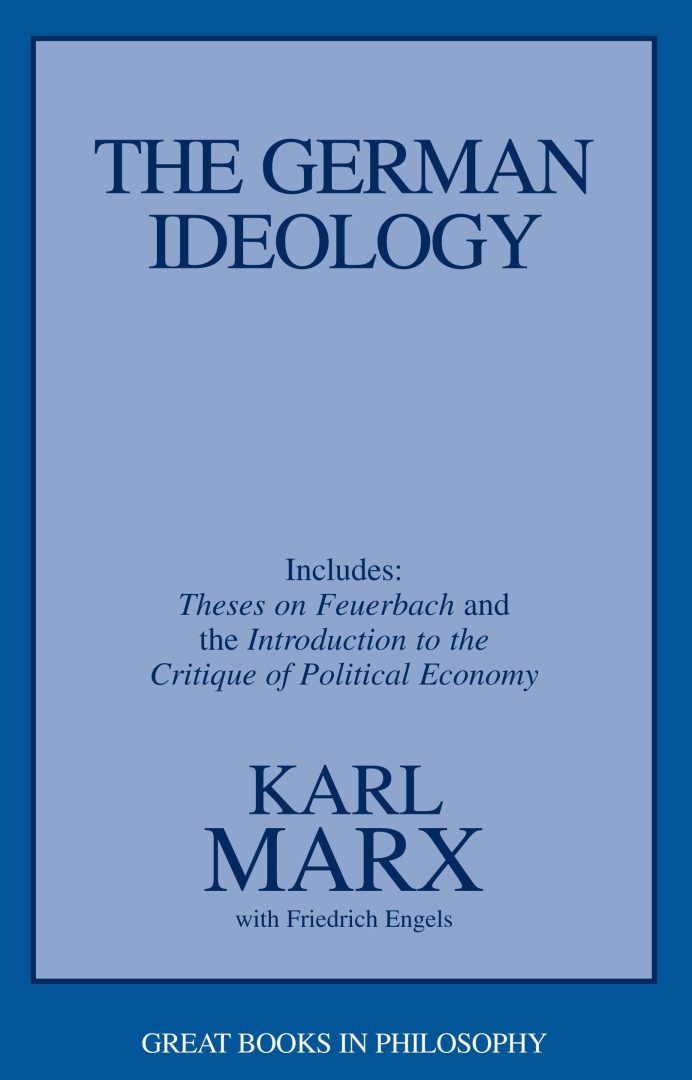Table of Contents
Philosophy as Revolutionary Praxis
Karl Marx’s Theses on Feuerbach (1845) and The German Ideology (written 1845–46, published posthumously) are concise yet explosive texts that mark a turning point in the trajectory of Western philosophy. These works demolish idealism’s contemplative detachment and inaugurate a new, materialist conception of history, known as historical materialism.
Rather than merely interpreting the world, Marx’s call is to change it—a shift from philosophy as theory to philosophy as practice, rooted in real human activity and social conditions.
Core Themes: Praxis, Materialism, and Ideological Critique
From Contemplation to Praxis: The Eleventh Thesis
The most famous of the Theses on Feuerbach is the final one:
“The philosophers have only interpreted the world, in various ways; the point is to change it.”
This sentence is not a slogan—it is the linchpin of Marx’s method. Human beings are not passive recipients of truth, but active agents who shape themselves and the world through praxis: embodied, transformative action.
Philosophy is criticized not for being wrong, but for being irrelevant when it ignores the lived conditions of real people.
Critique of Idealism: Feuerbach and German Philosophy
In critiquing Ludwig Feuerbach, Marx breaks with abstract humanism. While Feuerbach moved beyond religious idealism to focus on “man,” Marx sees even this as insufficiently grounded in the material world. What matters is not the essence of man, but how humans produce their lives, labor, and society.
The German Ideology continues this attack on Hegelian abstraction, mocking German philosophers for being locked in theoretical castles while ignoring the actual social and economic structures that govern human life.
Historical Materialism
Marx introduces a scientific approach to history: societies develop through modes of production, and class struggle is the engine of historical change. Consciousness is not autonomous; rather, it is a product of material conditions.
“It is not the consciousness of men that determines their being, but their social being that determines their consciousness.”
This inversion—turning Hegel’s idealism on its head—forms the basis of Marxist theory and reshapes the role of philosophy in political and historical analysis.
Ideology as Illusion
In The German Ideology, Marx and Engels dissect how the ruling class produces the dominant ideas of a given era—ideas that obscure the true relations of power. Ideology, then, is not just false belief, but a distortion necessary for maintaining exploitation.
They demystify intellectual systems that present themselves as eternal or neutral, exposing them as tools of ruling-class interest.
Influence and Legacy
These early texts would later underpin Marx’s more famous works, such as Das Kapital and The Communist Manifesto. Their influence stretches across:
- Critical theory and the Frankfurt School
- Post-structuralist and post-Marxist philosophy
- Political movements worldwide, especially in contexts of labor, anti-colonialism, and anti-capitalism
- Contemporary debates in sociology, anthropology, and cultural theory
Marx’s demand for a philosophy that intervenes in the world, not just explains it, continues to resonate in activist, academic, and artistic circles alike.
Strengths and Limitations
Strengths:
- A radical reframing of the function of philosophy
- Clear, polemical style that strips away abstraction
- Provides foundational tools for systemic social critique
Limitations:
- The brevity of the Theses means arguments are elliptical, requiring extrapolation.
- The German Ideology, while rich in ideas, can be fragmented and satirical to the point of obscurity.
- Some historical assumptions (e.g., class development stages) may appear overly deterministic by modern standards.
Who Should Read It?
- Students of political philosophy, critical theory, and sociology
- Activists and organizers seeking a philosophical foundation
- Readers of Hegel, Feuerbach, or German Idealism
- Anyone grappling with ideology, alienation, or historical change
TL;DR
Together, Theses on Feuerbach and The German Ideology are not merely early sketches—they are philosophical detonators. They reject the ivory tower, dismantle idealism, and insist that truth is not a matter of contemplation, but of practice.
These texts remain essential reading for anyone concerned with freedom, power, and the material structures that shape our lives.

Leave a Reply